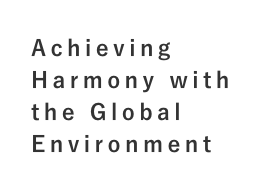


Zero Emission Initiatives That Generate No Waste and Toxic Substances
In the island of Tanegashima, the northern limit of Japan’s sugarcane production region, cultivation of sugarcane, which is considered to be an important staple crop, occupies around 30% of the island’s total acreage and around 60% of its total field crops. As a business operating in such environment, Shinko Sugar, a company of the Sumitomo Corporation Group, utilizes the byproducts and waste generated during the production process of sugar products as compost and boiler fuel inside and outside the factory. Shinko Sugar is also giving its utmost consideration to the environment through measures such as implementing an appropriate treatment process in liquid effluent discharge and gas emissions to ensure the removal of toxic substances.

Obtaining “Bird Friendly®” Certification That Protects the Forests Used as Resting Sites by Migratory Birds
“Bird Friendly® Coffee” is a program that seeks to protect the safety of migratory birds in tropical forests by promoting the purchase of shade grown coffee beans cultivated organically in those forests at a premium price, thereby supporting coffee growers and simultaneously preventing deforestation. The profits generated from these sales are used to fund research expenditures of the Smithsonian Migratory Bird Center, the founder of the program, for the purpose of protecting migratory birds around the world, as well as the ecosystems. At SC Foods, we are currently taking steps to import bird friendly cacao as well. We hope to begin importation and sales from 2023.

RSPO Certification for Palm Oil Obtained in November, 2019
Due to the fact that palm oil is easier to process and can be harvested in larger volume per unit area than other vegetable oils, it is used in a wide range of products from food product to chemical product. Its production volume is among the highest of all vegetable oil worldwide, but for traditional background, its plantation development is the source of many problems, including deforestation and violation of human rights such as forced labor and child labor. SC Foods has been preparing for the procurement of sustainable palm oil to obtain certification from RSPO (Roundtable on Sustainable Palm Oil).
Check our progress at www.rspo.org

A Modal Shift Initiatives Undertaken with Business Partners in Logistics and Distribution Channels
A “modal shift” refers to the transition from freight shipment by truck or other automobile to a lower environmental impact. At SC Foods, we will work together with our business partners who have a common understanding in shifting toward logistics operations that have positive impacts on the environment and the society. This involves the accumulation of small efforts, such as carrying out in-store processing and serving at local factories to cut down on the consumption of logistics resources and improve operational efficiency as well as shipping in reusable plastic boxes instead of cardboard or other disposable shipping materials.

10,000-ton Reduction in CO₂ Emissions by Switching to Woodchips
For the concentrated juices processed by our subsidiary JPNZ, a high volume of steam (thermal energy) is used in its processing operations of mashing, extraction, pasteurization, and concentration. At our factory in New Zealand, where environmental conservation initiatives are being implemented, SC Foods as the shareholder of JPNZ has made the decision to switch the fuel source generating the steam from coal to woodchips, thereby leading to reduced CO₂ emissions in its processing operations. In 2022, we will switch 30% of the total sources used to woodchips, and implement a 100% switch in 2023. By doing so, we estimate that we can reduce CO₂ emissions by 10,000 tons.

Initiatives to Reduce Household Garbage and Extend Best-Before Dates
An ordinary packaged beverage is lined with aluminum foil for greater preservation, It must be collected and disposed of different from paper milk cartons. However, the eco-friendly beverage container “Cartocan®” is lined with a special material, enabling it to be recycled like a paper milk carton. While conventional “paper-packaged” beverage has an estimated shelf life of six months from production, “Cartocan®” has a maximum shelf life of one and a half years, contributing to a reduction in wasted food products. At SC Foods, we focus on materials that make up even a portion of our products in order to provide high-quality and eco-friendly products.